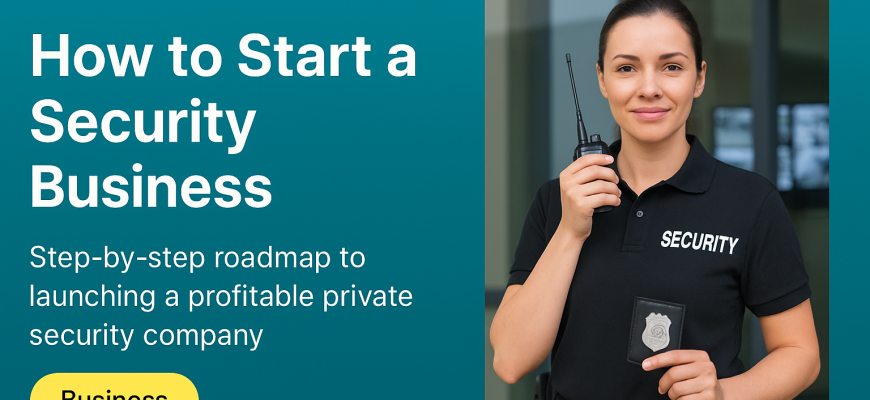Starting a business is always a brave endeavor. When that business is in the physical security field – like a security guard company, mobile patrol service, or on-site event security – it can feel especially bold. This industry has traditionally been male-dominated, but that landscape is changing. In the US alone, roughly 28% of security guards are women, and that number is growing. Women are proving every day that effective security work is about skill, training, and communication – not just brute strength. If you’re a woman with a vision of running a security business, know that you absolutely can succeed. In fact, your perspective and leadership can be a unique asset in this field.
This guide walks you through the key steps to launch a physical security business. Whether you plan to start as a solopreneur or build a full security team, these steps will help you navigate planning, licensing, staffing, and finding your first customers – all while building credibility in the industry.
- Step 1: Conduct Thorough Market Research
- Step 2: Define Your Niche and Services
- Step 3: Craft a Solid Business Plan
- Step 4: Handle Licensing, Insurance, and Certification
- Step 5: Establish Credibility and Trust from Day One
- Step 6: Plan Your Staffing – From Solopreneur to Team Builder
- Step 7: Market Your Services and Win Your First Clients
- Empowering Your Journey in Security Entrepreneurship
Step 1: Conduct Thorough Market Research
Every great business starts by understanding the market and customers. Begin with market research focused on security services in your area and the specific niche you want to fill. Here’s how to get started:
-
Assess Local Demand: Look around your community and identify who needs security services. For example, are local retail shops struggling with shoplifting? Do event venues or community festivals lack on-site security? Is there a neighborhood that could use mobile patrols at night? Pay attention to gaps – unmet security needs that your business could solve. This gap could be your opportunity.
-
Study the Competition: Research existing security companies in your region. What services do they offer, and what do they charge? Identifying the established players will tell you how you can differentiate. Perhaps the market is saturated with general security guard firms, but few specialize in event security for small venues – that might be a gap you fill. On the other hand, if you find many competitors, think about what unique value you can bring (for instance, a woman-led team might appeal to certain clients, which we’ll discuss more later).
-
Talk to Potential Clients: Don’t be shy about networking early. Speak with business owners, event organizers, or property managers about their security needs and frustrations. Their insights can validate your business idea and even land you your first client. For example, a local business association might tell you they wish there were more mobile patrols deterring after-hours vandalism – intel that can shape your service offering.
By the end of your market research, you should have a clear picture of the demand, the gaps in the market, and who your ideal customers will be. This foundation will guide every step that follows.
Step 2: Define Your Niche and Services
With market insights in hand, the next step is to define a niche for your security business. Physical security is a broad field – focusing on a niche will help you stand out and build expertise. Ask yourself: What specific problem am I best suited to solve, and for whom? Here are some niche ideas in the security industry:
-
On-Site Security Guards: Providing stationed guards for businesses, schools, hospitals, or residential complexes.
-
Mobile Patrol Services: Conducting scheduled or random patrols (often by car) to cover multiple properties, construction sites, or neighborhoods.
-
Event Security: Offering crowd management, entry screening, and safety oversight for concerts, conferences, sports events, or private gatherings.
-
Executive Protection (Bodyguard Services): Serving high-profile or at-risk individuals who need personal security protection.
-
Retail Loss Prevention: Specializing in guarding retail stores or malls to prevent theft and ensure shopper safety.
-
Security Consulting and Risk Assessment: If you have a background in security strategy, you might consult on security plans, conduct vulnerability assessments, and advise clients on improving their physical security setups.
Focusing on a niche doesn’t mean you only do one thing, but it helps you market yourself as an expert in that area. For example, you might primarily offer event security for corporate functions, but also take on other guarding jobs occasionally. The key is that your marketing and branding highlight a specialty. Choosing a niche will also clarify what training, equipment, and staffing you need. As Connecteam’s security startup guide puts it, “When you choose a security service niche to focus on, the rest of the process becomes much easier.”
Action tip: Write down a simple value proposition for your business: “I provide [X type of security] for [Y type of client] in [Z location].” For example, “I provide all-female event security teams for community festivals and concerts in my city,” or “I offer mobile patrol services for suburban businesses after hours.” This clarity will guide your business plan and marketing.
Step 3: Craft a Solid Business Plan
Now that you know your niche and market, it’s time to put it all into a business plan. This plan is your roadmap – it forces you to think through how you’ll operate and make money, and it’s essential if you ever seek financing. Keep it practical and detailed. Key elements to include:
-
Company Description and Vision: Describe the core mission of your security business. For instance, “to provide reliable night patrols that give local business owners peace of mind,” along with why being a woman-led firm is an advantage you bring.
-
Market Analysis: Summarize your market research – who your target clients are, what their needs are, and how your services fill a gap. Include a look at competitors and how you’ll differentiate (e.g. offering superior customer service, specialized training, or a community-oriented approach).
-
Services and Pricing: Outline the specific services you’ll offer in your niche. Will you offer armed and/or unarmed guards? Patrols once an hour or only on-demand? What will you charge (hourly rates, monthly contracts, event-based fees)? Research going rates in your area so you price competitively yet sustainably.
-
Startup and Operating Costs: List out all expected expenses to start and run the business. Typical costs include licensing and legal fees such as registrations and security license applications, insurance – which can be a significant expense to cover liability – equipment and uniforms like high-visibility jackets, flashlights, two-way radios, and possibly patrol vehicle costs, office setup even if home-based (including a computer, business phone, and eventually office space as the business grows), marketing expenses such as website development, business cards, and advertising, staffing costs including salaries or hourly wages, benefits, and payroll taxes if hiring employees, and an emergency fund to cover unplanned expenses or slower business periods. Some experts estimate you may need at least around $10,000 to launch a small security company, to cover basics like insurance, licensing, initial equipment, and marketing. Planning these numbers in advance will prevent nasty surprises.
-
Legal Structure and Administration: Decide on your business structure – many small security entrepreneurs choose an LLC (Limited Liability Company) to protect personal assets, but you might opt for a sole proprietorship or corporation depending on your situation. Register your business name (pick something professional that instills confidence), and set up essentials like a business bank account and accounting system. Plan how you’ll handle bookkeeping and taxes from day one.
-
Marketing and Sales Plan: Outline how you intend to acquire clients (we’ll dive deeper into marketing later, but in your plan note your key strategies, whether it’s networking, online marketing, targeting specific industries, etc.). If you have any connections or early contracts lined up, mention them here.
-
Growth Plan: It might seem early, but think about your goals for growth. Will you start solo and hire 5 guards within two years? Do you aim to expand to a new city eventually? Having a vision will help you make decisions that align with long-term goals.
Writing the business plan can be a lot of work, but it’s incredibly empowering. It transforms your idea into a concrete strategy. Plus, if you need funding or want to attract a partner, a solid plan shows you’re serious and have thought things through.
(Pro tip: As a business coach, I often tell my clients – don’t skip the financial projections in your plan. Estimate your income and expenses month-by-month for the first year. This exercise will show you how many contracts or hours of work you need to break even and be profitable. Even if projections are just educated guesses, they’re crucial for decision-making.)
Step 4: Handle Licensing, Insurance, and Certification
The security industry is heavily regulated – and for good reason. Clients trust you to protect people and property, so authorities want to ensure only qualified, vetted businesses operate in this field. This step is all about taking care of the legal and professional requirements: getting your licenses, certifications, and insurance in order. It might seem intimidating, but with preparation you can navigate it successfully.
1. Business and Security Licensing: The exact licenses you need will depend on your location (every country, and in the US even each state, has its own rules). Generally, you will likely need:
-
A general business license for your city or county (a basic permit to operate a business locally).
-
A security company license at the state or national level. In many places, you must obtain a specialized license (often called something like a Private Patrol Operator license or Security Agency license) to legally offer security guard services. For example, California and Texas require a private security company license even if you’re just one person starting out. Do the research on your jurisdiction: check your state/province’s department of public safety or security regulatory authority for the exact requirements and application process. This usually involves an application, a fee, and a background check.
-
Individual guard licenses or certifications: If you personally will work as a security guard (or if you hire guards), each individual may need to be licensed or certified. Often this is called a guard card or security guard certification obtained after a certain training course. Ensure you and any staff meet the training and certification mandates for unarmed or armed guards as required in your area. For instance, an unarmed guard might need 8–16 hours of training and a background check, whereas an armed guard could need a more intensive course and a firearms permit.
-
Firearm permits (if applicable): If your business will provide armed security services or carry weapons, there are additional layers of licensing. Typically, both the company and the individual guards must obtain firearm permits or endorsements. For example, many states in the US require security officers to get a specific armed guard license (in Florida, a Class “G” license) which involves firearms training and a skills test. Ensure you follow all gun regulations meticulously – operating armed security without proper credentials can lead to serious legal trouble.
-
“Qualified Manager” or “Qualifying Agent”: Some jurisdictions require that a person with a certain level of security experience or certification be named as the qualifying agent or manager for the security firm. This means if you don’t have, say, the minimum years of security field experience, you might need to hire or partner with someone who does to fulfill this role. The qualifying agent is essentially the licensed security professional responsible for the company’s compliance. Don’t let this requirement discourage you – it’s often a hurdle women overcome by bringing on a trusted partner or even a retired law enforcement officer as an advisor in the beginning. What’s important is that you plan for it so you can legally get your license.
-
Other permits: Depending on your services, you might need extra permits. For example, some cities require a permit for operating a patrol vehicle with security markings, or an alarm responder permit if you’ll handle alarm monitoring. Also, if you’ll do security at large one-off events (like a festival), occasionally a special event security permit is needed. Check your local regulations so you’re not caught off guard.
2. Insurance and Bonding: In the security business, insurance isn’t optional – it’s usually mandatory for licensing and absolutely critical for protecting your company. At minimum, you will need:
-
General Liability Insurance: This covers you if something goes wrong during a security job – for example, if a client’s property is damaged or a person is injured on your watch. Security guard insurance can be pricey (several thousands of dollars per year) because of the high responsibility involved. However, it’s non-negotiable. Many states require proof of liability coverage (often a certain minimum amount) before issuing your security company license.
-
Bonding / Surety Bond: Many security contracts, and some state laws, require a surety bond or bonding insurance. This is essentially a guarantee against theft or unethical conduct – for instance, if one of your employees stole from a client, the bond could compensate the client. Being bonded is a great trust signal to clients. Sometimes the state will require a bond (e.g. a $10,000 bond is common) as part of licensing.
-
Workers’ Compensation Insurance: If you hire employees, this insurance (which covers employee injuries on the job) is often legally required once you have a certain number of staff. Given the physical nature of security work, don’t overlook this.
-
Vehicle Insurance: If you use a car for patrols, make sure it’s insured for commercial use.
Insurance costs can add up, so shop around and even negotiate – some insurers specialize in security businesses and can offer guidance. It’s wise to consult an insurance broker who understands your industry’s needs. Remember, adequate insurance isn’t just bureaucracy: it’s peace of mind for you and your clients.
3. Professional Certifications and Training: While not always required by law beyond the basic guard licensing, acquiring extra certifications can greatly boost your credibility. Consider pursuing:
-
First Aid/CPR Certification: Being able to handle medical emergencies is a valuable skill in security work. Clients will appreciate a guard (or company) that can respond to an injury or health incident calmly and effectively.
-
Self-Defense and Conflict De-escalation Training: Many organizations offer training in how to defuse tense situations, handle aggressive behavior, or use minimal force. This is especially useful if you lack prior security or law enforcement experience – it shows you’ve trained for the scenarios you might face.
-
Industry Certifications: Organizations like ASIS International offer certifications such as the CPP (Certified Protection Professional) for security management professionals. Earning such credentials can set you apart, especially if you’re targeting more corporate or high-end clients. Similarly, attending seminars or courses on topics like crowd management, cybersecurity basics (for integrated security solutions), or executive protection can broaden your skill set.
-
Continued Education: Make a habit of staying updated. The security field evolves with new technology (drones, advanced CCTV, etc.) and new best practices. Subscribe to security industry publications, join local security associations (many have women in security groups or mentorship programs), and never stop learning. This not only makes you better at what you do but also shows clients that you are a true professional.
Licensing and compliance might be the least glamorous part of starting a security business, but it’s one of the most important. Give yourself time to get these steps done. It may take weeks or even a few months to complete all paperwork, background checks, training, and approvals. Don’t rush the launch until you have your legal bases covered – operating without the proper license or insurance could shut down your dream before it really begins.
(Inspiration moment: Every hurdle you clear – whether it’s a licensing exam or the wait for an approval – is strengthening your foundation. It’s proving that you belong in this industry. Take pride in each certificate and license you earn; you’re becoming not just a business owner, but a bona fide security professional.)
Step 5: Establish Credibility and Trust from Day One
In the security business, trust is everything. Clients need to feel absolutely confident in you and your team. As a new entrepreneur (and especially as a woman in a field where some might not expect to see a woman in charge), establishing credibility early on is key. Here’s how to start building a trustworthy reputation from day one:
-
Leverage Your Background and Story: Every entrepreneur has a story. What’s yours? Maybe you’re a former police officer or military vet, or you’ve worked as a security guard for years and are now going out on your own. Perhaps you’re a savvy businesswoman who’s passionate about community safety. Tell your story on your website and in conversations. Highlight any relevant experience, training, or even life experiences that contribute to your ability to run a security firm. If you lack direct security experience, emphasize your commitment to training and the strengths you bring (like leadership skills, reliability, and integrity) and mention any qualified partners or hires you’ve brought on for their expertise.
-
Professional Branding: First impressions matter. Develop a professional brand identity for your company – this includes a strong name, a clean logo, and maybe a tagline that inspires confidence. For example, if your business name is “Guardian Shield Security,” a tagline might be “Protection You Can Trust.” Ensure your uniforms or attire look sharp and consistent when on duty. Even if it’s just you to start, invest in a good uniform or at least a polo/shirt with your company name. This shows you take your role seriously and helps others see you as a legitimate security provider, not “just a guard”. As a woman in uniform, you might attract curiosity – let your professionalism do the talking.
-
Create an Informative Website and Online Presence: These days, people will often look you up online before contacting you. A well-designed website is crucial for credibility. It doesn’t have to be fancy or expensive – a simple site that clearly states your services, your qualifications, and contact information is enough. Include an “About” page with your story and credentials, and maybe a photo of you (to put a personable face to the business). If you have any training certificates or your business is licensed/bonded/insured, mention that proudly. Also set up a Google Business Profile so that your business appears in local search results and maps (this is important for local service companies). Early on, you might not have client testimonials yet, but you can post any ** endorsements** or quotes from mentors or colleagues to build trust. Down the line, be sure to feature client feedback prominently.
-
Deliver Excellence on Your First Jobs: Your early gigs – no matter how small – are going to be your springboard to credibility. Over-deliver for those first clients. Show up early, be extremely professional, and go the extra mile in service. These initial successes will do two things: (1) give you confidence and positive word-of-mouth, and (2) provide you with testimonials or case studies to showcase. Even a short email from a happy client saying “Thanks, we loved the service you provided at our event” is gold – with their permission, quote it on your website or marketing materials. Each successful job is proof that yes, you can run a security business and do it well.
-
Network and Join Industry Groups: Credibility isn’t just built between you and clients – it also grows through peer recognition. Join local business networks and any security industry associations accessible to you. Being an active member of groups like ASIS International or local security guard associations can lend credibility (you can mention memberships in proposals or on your site). Importantly, these groups often have women’s forums or mentorship programs. Connecting with other women in security can provide support and further establish your presence in the industry. It shows that you’re a serious professional continuously engaging with the field.
-
Consider a Women-Owned Business Certification: This is a bit longer-term, but as your business formalizes, you can look into getting certified as a Women’s Business Enterprise (WBE) or other similar certifications if you’re eligible. These certifications (offered by organizations like WBENC in the U.S.) officially recognize your company as woman-owned and can open doors to corporate and government contracts that have supplier diversity goals. Holding a certification like this adds to credibility and can be a selling point in marketing. It signals that you’ve gone through a vetting process and are recognized among reputable women-owned businesses. (Keep in mind you typically need at least 6–12 months of business operations to apply, so put this on your future to-do list.)
Remember, credibility is built over time, but you can accelerate it by being intentional and consistent in how you present yourself and your company. Every interaction – whether with a potential client, an industry peer, or a vendor – is a chance to reinforce that you are competent, reliable, and trustworthy. As a coach, I’ve seen women break down skepticism by simply being excellent at what they do and always acting with integrity. Let your work speak for itself, and soon enough your reputation will precede you.
(And here’s a secret: being a woman can actually be a credibility advantage in some cases. Many clients appreciate the skills women bring – such as strong communication and de-escalation abilities. Some even specifically seek female security officers for certain roles or environments, like working with other women or providing a more approachable presence in a hospitality setting. So hold your head high – you’re not just equal to your male counterparts, you’re sometimes the preferred option!)
Step 6: Plan Your Staffing – From Solopreneur to Team Builder
When launching a security business, one big decision is whether to start solo or with a team. There’s no single right approach – it depends on your resources, the contracts you aim to secure, and personal preference. Women entrepreneurs excel in both modes: some run successful one-woman operations, while others build companies employing dozens. Here’s advice for each path:
For the Solopreneur: If it’s just you at the beginning, that’s perfectly fine. Many great security companies began with one dedicated owner-operator. As a solopreneur, you’ll likely also be the one patrolling sites or standing guard at events as you start out. To make this work:
-
Be strategic with contracts. You can’t be in two places at once, so take on jobs you can handle yourself and that fit your schedule. Perhaps you focus on event-based work (like weekend events) or night patrols for a small roster of clients that you can rotate through.
-
Manage your time and energy. Security work can be physically and mentally demanding. Ensure you get enough rest between shifts. Since you’re also the CEO, set aside time for administrative tasks (like invoicing clients, marketing, and continuing education) during the week. It’s a lot of hats to wear – but with good time management, it’s doable.
-
Have backup plans. Even solo, you should build a network of reliable contacts in the industry. Get to know a few other independent security professionals in your area. You might occasionally need an extra hand for a bigger gig or someone to cover you if you fall ill or go on vacation. Subcontracting work to trusted colleagues when needed can keep your clients happy without you having to turn down opportunities.
-
Project a professional image. Don’t let the fact that you’re solo make clients think you’re “small” or incapable. Use language like “we” and “our company” in marketing (that’s common even for one-person businesses). Many clients won’t mind if it’s just you, as long as you deliver. Over time, you can always expand – which brings us to…
When Building a Team: If your vision is to establish a team of security officers (now or eventually), you’ll need to think about recruitment, training, and management from the start.
-
Hire the right people. Look for individuals who are not only properly licensed and skilled, but who also share your values for professionalism and customer service. Perhaps you’ll recruit former colleagues from a past security job, or advertise on job boards for certified guards. As a woman leader, you have the chance to build an inclusive team culture from the ground up – consider giving opportunities to other women in security alongside qualified men, creating a diverse team that can handle various client needs. (Diversity can actually be a selling point, as clients may request female guards for certain situations, as noted earlier.)
-
Vetting and trust: Do thorough background checks on any hires – this is often required by law, but even if not, it’s essential. Your employees will be the face of your company and entrusted with safety; one bad hire can ruin your reputation. Verify references, confirm their licenses/certifications, and maybe require a probation period or shadowing to ensure they meet your standards. It’s okay to trust your gut, too – if someone doesn’t feel right, don’t hire in haste.
-
Training your team: Even if a guard comes in with experience, provide orientation on your company’s protocols and expectations. If you have particular ways you want reports written or specific customer service standards (e.g. greeting clients, dress code, etc.), train everyone consistently. You might conduct monthly training refreshers or safety meetings. As the business owner, you set the tone for continual improvement. Consider sending staff for additional training or certifications (e.g. active shooter response, advanced first aid) as your budget allows – it will elevate your service quality.
-
Leadership and culture: Transitioning from solopreneur to team leader is a learning curve. Aim to be a boss who leads by example. Show that you’re willing to roll up your sleeves – maybe you work shifts alongside your team occasionally. Foster open communication; encourage your guards to voice concerns or suggestions. Security work can be tough, so boost morale by acknowledging jobs well done and perhaps offering perks like flexible schedules or mentoring. A positive team culture will reduce turnover (a common issue in security companies) and lead to better service for your clients.
-
Staffing schedules and scalability: As you gain clients, scheduling becomes critical. You may need to cover 24/7 rotations for some contracts. Plan out shifts fairly and ensure no one (including you) is overextended – fatigue can lead to mistakes. Also, don’t take on a contract that requires more manpower than you have before hiring the necessary staff. It’s tempting to “say yes and figure it out,” but in security, failing to adequately staff a job can be dangerous. It’s better to grow steadily. That said, having a roster of part-time guards or on-call employees can give you flexibility to accept occasional big gigs (like a large event needing 10 guards for one night) without keeping everyone on full-time payroll.
Whether solo or with a team, as the owner you are the captain of the ship. Your organization, planning, and leadership will determine how smoothly operations run. If you’re a one-woman operation, embrace the agility and personal touch you can offer. If you’re building a team, step confidently into your role as a leader – your team’s performance will reflect the guidance and example you set. Many women have grown their security startups into thriving firms by hiring great people and leading with character and integrity. You can be one of them.
Step 7: Market Your Services and Win Your First Clients
Now for the exciting part: getting customers and growing your business! You’ve laid the groundwork – you know your niche, you have a plan, you’re licensed and ready. It’s time to put yourself out there and acquire clients. Marketing a security business is about building relationships and showcasing trustworthiness. Here are some strategies to get your first contracts and beyond:
-
Build a Strong Brand Presence: Earlier we discussed branding for credibility; now use it in your marketing. Ensure your logo and messaging appear consistently on your website, social media, and any flyers or business cards. Position your company as the go-to security solution for your niche. For example, if you’re targeting event planners for event security jobs, your materials should speak their language (emphasize crowd safety, smooth guest experience, etc.). Claim your profiles on LinkedIn, Facebook, or even Instagram if it’s relevant to your community – sometimes posting photos of your team at community events (with permission) or sharing safety tips can engage your audience and subtly market your services.
-
Network, Network, Network: Especially for local services, in-person networking can unlock opportunities. Attend community business meetups, chamber of commerce events, or industry conferences. Let people know who you are and what you do. As a woman in a unique field, you’ll be memorable – use that to your advantage. For instance, if there’s a local chapter of a women entrepreneur network, join it; you might meet a restaurant owner there who needs weekend security, or a festival organizer planning her next big event. Always carry business cards. And don’t hesitate to ask friends and family for introductions – someone always knows someone who could use a reliable security provider. Personal referrals build instant trust.
-
Highlight Your Unique Value: When pitching to potential clients, be ready to answer the question, “Why should we choose you over another security company?” Avoid generic answers like “we offer the best service” – instead, give specifics. Maybe you focus on a niche (e.g. “We specialize in boutique hotel security, so we understand the balance between hospitality and safety.”). Maybe you emphasize quality training (“All our security staff are certified in first aid and conflict de-escalation.”). If you’re a small/new company, you can turn that into a plus: “As the owner, I personally oversee every assignment and client relationship, so you’ll get a level of attention larger firms can’t match.” And yes, you can mention being a woman-owned business as part of your story – many companies and event organizers love supporting diversity and might find your perspective refreshing. The key is to differentiate yourself with whatever truly sets you apart.
-
Online Marketing and SEO: Make sure people can find you when they search for security services in your area. Optimize your website for local searches: include keywords like “security guard services in [Your City]” on your site, and register on Google and other directories. Encourage early clients to leave reviews on Google or Yelp – positive reviews will boost your credibility for future customers. If you have the budget, you could consider running modest online ads targeting your city (for example, Google Ads for “event security [city]”). Also, content marketing can help – perhaps write a few simple blog articles or LinkedIn posts about safety tips or “what to look for in a security provider.” This demonstrates expertise and can attract readers who might become clients.
-
Direct Outreach: Especially for B2B services, sometimes directly contacting potential clients works well. Identify a handful of businesses or organizations that could use your services. For instance, if you offer mobile patrol for residential areas, you might reach out to homeowner associations or property management companies. Send a professional introduction email or letter, or drop by in person with a flyer. Don’t be pushy – simply introduce yourself, leave your info, and highlight one or two benefits (“Just wanted to let you know our new company is offering nightly patrols in the industrial park – it’s a flexible month-to-month service aimed at reducing vandalism. If you’re interested, we’d love to chat.”). Even if 9 out of 10 say no initially, that 10th could be your break. And sometimes, those who said no keep your card and call later when a need arises.
-
Leverage Early Successes into More Business: Once you land a client and do a great job, capitalize on it. Ask for a testimonial or a reference. Small security companies often grow through word-of-mouth. If you secured an event flawlessly, the event organizer might recommend you to peers. Don’t be afraid to ask for referrals: “We’re looking to serve more clients like you. Do you know anyone else who might need security services? I’d appreciate if you could pass along my info.” Satisfied clients usually want to support you. Additionally, case studies can be powerful – for example, write a short post on your website or social media: “Last weekend, [Your Company] was proud to provide security for the ABC Charity Gala. Our team managed a crowd of 500 guests, ensuring a safe and successful event!” (Include a photo if appropriate). This not only showcases your work but also tags the client (with permission), potentially getting visibility to everyone who attended that event or others in that circle.
-
Attend Industry Events and Stay Visible: The security industry sometimes has expos, training workshops, or vendor events. Consider attending or even sponsoring a booth if it’s local and affordable. Being visible in the industry community builds your brand. Also, continue engaging with those women-in-security networks and business groups – as you succeed, you might even get featured or interviewed as a rising entrepreneur, which is fantastic marketing without paying a dime!
Marketing is an ongoing effort. In the beginning, you might spend a lot of time marketing to get a few contracts. But as your reputation grows, momentum builds – happy clients lead to new clients, and your name gets known. Persistence is key. Don’t get discouraged by slow responses or a quiet month. Keep putting yourself out there. Every connection you make is planting a seed that could yield business later.
(Personal insight: One of my coaching clients, a woman who started a security firm, got her big break when she volunteered to give a free safety presentation at a local community center. It was essentially a goodwill effort – but a business owner in the audience was so impressed, he hired her for a contract on the spot. The lesson? Opportunities often come unexpectedly from putting yourself out there and showing your expertise. So seize those chances!)
Empowering Your Journey in Security Entrepreneurship
Starting a physical security business as a woman is both a challenge and an opportunity. You’re stepping into a role that will test your courage, resilience, and determination – but it will also showcase your strengths, vision, and leadership.
Celebrate the milestones – your first license, your first client, your first hire, and so on. Each is proof that you are turning your dream into reality. From one woman entrepreneur to another: I believe in you. Your journey to start a physical security business might not always be easy, but it will be rewarding. Stay focused, stay inspired, and never forget – you have the strength to secure not only others’ safety but your own success.
Now, take a deep breath, stand tall, and step boldly into this new venture. The skills can be learned, the steps can be managed – and you are exactly the right person to lead this mission. Here’s to seeing your security business thrive. Good luck, and go make it happen!









